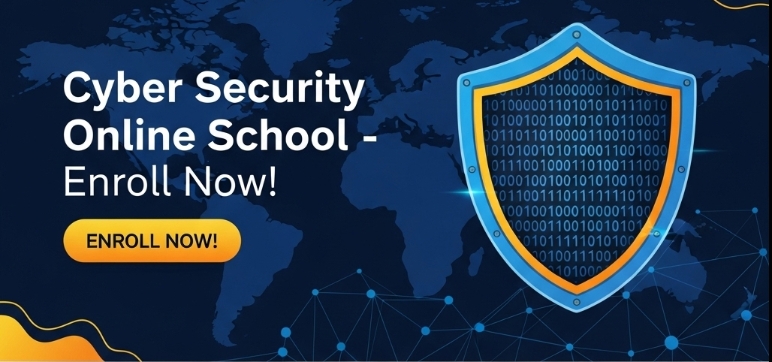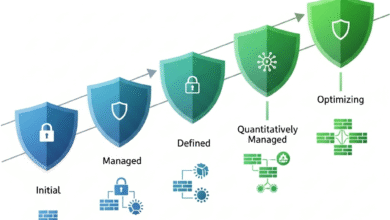Cyber Security Online School
Finding the Perfect Cyber Security Online School for You

Cyber Security Online School
Ready to Launch Your Cyber Security Career? Finding the Perfect Cyber Security Online School for You
Hey there, future cyber defender! Feeling the pull towards a career where you protect the digital world? You’re not alone. With cyber threats constantly evolving and a massive skills gap in the US (we’re talking hundreds of thousands of unfilled jobs!), there’s never been a better time to dive in. And guess what? You don’t necessarily need to quit your job or relocate to get the top-notch education you deserve. A high-quality cyber security online school can be your launchpad, offering the flexibility, rigor, and practical skills needed to thrive in this critical field. Let’s navigate the exciting world of online cyber security education together and find the program that fits your goals and lifestyle.
Why Choose a Cyber Security Online School? The American Advantage
The traditional college campus experience isn’t feasible for everyone. Maybe you’re balancing a current job, family responsibilities, living in a rural area with limited local options, or simply crave a more self-paced learning environment. This is where a cyber security online school truly shines, especially for American learners:
-
Unmatched Flexibility & Accessibility: Learn from anywhere with an internet connection – your living room, a coffee shop, or even during your lunch break. Schedule coursework around your life, not the other way around. This is a game-changer for working professionals, veterans transitioning to civilian careers, parents, and anyone seeking a career change without uprooting their life.
-
Diverse Program Offerings: From foundational certificates to specialized master’s degrees, cyber security online school options cater to all levels. Whether you’re starting from scratch with IT fundamentals or looking to specialize in areas like penetration testing, cloud security, or threat intelligence, there’s an online path.
-
Pace That Fits You: Many programs offer asynchronous learning (learn on your own schedule) or blended models with live virtual sessions. Accelerated tracks exist for those eager to launch quickly, while part-time options accommodate busy schedules.
-
Cost-Effectiveness: While not always cheap, online programs can eliminate costs associated with commuting, relocation, and sometimes campus fees. Plus, you can often keep earning while you learn. Many reputable cyber security online school programs also accept federal financial aid (FAFSA), GI Bill® benefits, and employer tuition assistance.
-
Learning Relevant, Cutting-Edge Skills: Top-tier online programs are built with industry input. They focus on the tools, techniques, and frameworks (like NIST, MITRE ATT&CK) used daily by US security professionals, ensuring you graduate job-ready. Labs are often delivered through virtual environments, simulating real-world scenarios.
What Makes a GREAT Cyber Security Online School? Key Features to Demand
Not all online programs are created equal. When evaluating a cyber security online school, look for these essential markers of quality and effectiveness:
-
Industry-Recognized Credentials & Alignment: Does the program prepare you for crucial certifications like CompTIA Security+, CISSP, CEH, CISM, or AWS/Azure security certs? Are these certs often included or offered at a discount? Alignment with certifications is a strong signal of practical relevance.
-
Hands-On, Virtual Lab Environments: Cybersecurity is a doing field. Theory is useless without practice. The best cyber security online school programs provide extensive access to virtual labs. Look for platforms like:
-
Interactive Cyber Ranges: Simulated networks for practicing attack and defense scenarios.
-
Virtual Machines (VMs): Pre-configured environments for malware analysis, forensics, and tool usage (Wireshark, Metasploit, SIEMs).
-
Cloud Security Labs: Hands-on experience with AWS, Azure, or GCP security configurations.
-
-
Expert Faculty with Real-World Experience: Who are you learning from? Instructors should be seasoned cybersecurity professionals, not just academics. Look for faculty bios listing relevant industry experience (SOC analysts, pen testers, CISOs, incident responders).
-
Robust Student Support Services: Online doesn’t mean alone. Excellent programs offer:
-
Dedicated technical support for lab platforms.
-
Academic advising and career services tailored to cybersecurity.
-
Active online communities (forums, Slack channels) for peer collaboration.
-
Access to online tutoring or mentoring.
-
-
Regional or National Accreditation: This is non-negotiable for legitimacy and financial aid eligibility. Look for accreditation from bodies like the Higher Learning Commission (HLC) or other recognized regional accreditors. Programmatic accreditation (like ABET for some computing programs) is a plus but less common specifically for cybersecurity undergrad degrees.
-
Career Outcomes & Industry Connections: What’s the track record? Do they publish graduate employment rates? Do they have partnerships with companies for internships or job placements? A strong cyber security online school actively bridges the gap to employment.
Navigating the Curriculum: What You’ll Learn at a Top Cyber Security Online School
While specific courses vary, a comprehensive program will cover core domains essential for US cybersecurity roles:
-
Foundations: Networking fundamentals, operating systems (Windows/Linux), system administration.
-
Core Cybersecurity Principles: Confidentiality, Integrity, Availability (CIA Triad), risk management, cryptography, access control models.
-
Defensive Security: Security Operations Center (SOC) fundamentals, Security Information and Event Management (SIEM), Endpoint Detection and Response (EDR), intrusion detection/prevention systems (IDS/IPS), firewall configuration, vulnerability management, patch management.
-
Offensive Security (Ethical Hacking): Penetration testing methodologies, vulnerability scanning, exploitation techniques, web application security, network reconnaissance.
-
Digital Forensics & Incident Response (DFIR): Evidence collection and preservation, malware analysis, incident handling procedures, chain of custody, forensic tools.
-
Cloud Security: Securing cloud infrastructure (IaaS, PaaS, SaaS), identity and access management (IAM) in the cloud, cloud security posture management (CSPM).
-
Governance, Risk & Compliance (GRC): Understanding frameworks (NIST CSF, ISO 27001, PCI DSS), security policies, audits, legal and ethical considerations (especially relevant to US regulations).
-
Specialized Electives: Often available in areas like Industrial Control Systems (ICS) security, threat intelligence, secure coding, mobile security, or security leadership.
Beyond the Degree: Certifications and the Cyber Security Online School Advantage
While your degree or certificate provides foundational knowledge, certifications are the currency of the cybersecurity realm. A good cyber security online school will seamlessly integrate certification preparation:
-
Embedded Certification Content: Coursework directly aligns with exam objectives for key certs (e.g., Security+ material covered in core classes).
-
Voucher Discounts: Schools often have partnerships to offer discounted exam vouchers.
-
Dedicated Prep Courses: Some programs include specific certification prep modules or courses.
-
Practice Exams & Resources: Access to practice tests and study materials.
Common Pathways & Career Trajectories (Starting with Your Cyber Security Online School)
Your online education can open doors to diverse and well-paying roles:
-
Entry-Level: Security Analyst, SOC Analyst, Vulnerability Analyst, IT Auditor, Network Administrator (Security Focus).
-
Mid-Level: Penetration Tester, Security Engineer, Incident Responder, Forensics Analyst, Cloud Security Engineer.
-
Advanced/Specialized: Security Architect, Threat Intelligence Analyst, Security Consultant, Cybersecurity Manager, Chief Information Security Officer (CISO).
-
Niche Areas: ICS/SCADA Security Specialist, Malware Researcher, Cryptography Specialist.
Salary Potential: Investing in Your Future
Cybersecurity professionals command strong salaries across the US due to high demand. While figures vary by location, experience, and specific role, here’s a snapshot (source: BLS, Cyberseek.org):
-
Information Security Analysts (Median): Over $120,000 per year (significantly higher in tech hubs).
-
Penetration Testers: Often $90,000 – $150,000+.
-
Security Architects: Frequently $140,000 – $200,000+.
-
CISOs: Can reach well into the $200,000s and beyond.
Your cyber security online school credential is a powerful step towards claiming your share of this rewarding market.
Choosing YOUR Perfect Fit: A Step-by-Step Guide
Ready to start your search? Here’s how to find your ideal cyber security online school:
-
Define Your Goals: Are you starting fresh? Transitioning from IT? Seeking management skills? Target programs aligned with your career stage and aspirations (certificate, associate, bachelor’s, master’s).
-
Research Thoroughly: Use trusted resources like the National Centers of Academic Excellence in Cybersecurity (NCAE-C) listings (a US DoD/DHS designation), rankings (considering online-specific rankings), and review sites. Make a shortlist.
-
Scrutinize Accreditation: Verify institutional accreditation status on the accreditor’s website. Don’t take the school’s word alone.
-
Dive Deep into Curriculum & Labs: Look beyond course titles. What specific tools are taught? What does the lab access entail? How are hands-on skills assessed?
-
Investigate Faculty Credentials: Check instructor bios on the school website. Do they have relevant, current industry experience?
-
Connect with Admissions & Current Students: Ask detailed questions about support, flexibility, lab access, and career services. Try to connect with alumni on LinkedIn.
-
Understand Costs & Financial Aid: Get a clear breakdown of tuition, fees, and any required tech (like a capable computer). Explore financial aid options (FAFSA, scholarships, military benefits, employer programs).
-
Check Tech Requirements: Ensure your home setup (computer specs, internet speed) meets the program’s demands, especially for resource-intensive labs.
Red Flags to Watch Out For
-
Lack of Accreditation: Steer clear.
-
Overly Promised Job Guarantees: Be wary of absolute guarantees; reputable schools offer strong career support, not promises.
-
Excessive Focus on “Easy” or “Quick”: Quality cybersecurity education requires rigor and time.
-
Vague Curriculum or Lack of Hands-On Labs: If you can’t see specifics about practical skills training, be cautious.
-
Poor Student Reviews or Reputation: Research complaints or negative feedback thoroughly.
The Future is Online, Secure, and Yours to Shape
Choosing the right cyber security online school is a significant investment in your future. It’s the key to unlocking a dynamic, in-demand career where you make a real difference protecting individuals, businesses, and critical infrastructure across America. By prioritizing hands-on learning, industry alignment, strong support, and proper accreditation, you can find an online program that provides the knowledge, skills, and credentials to excel. Don’t let location or a busy schedule hold you back. Take the first step today, research your options, and get ready to launch your journey as a cybersecurity professional. The digital frontier needs your skills!



